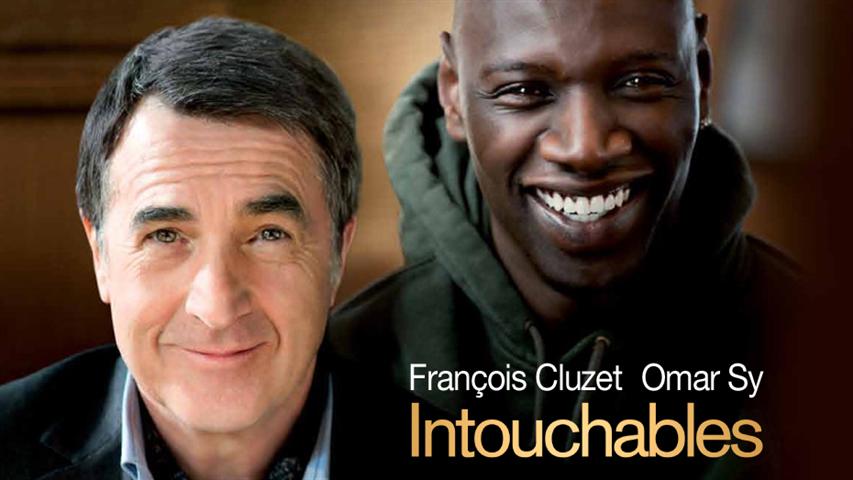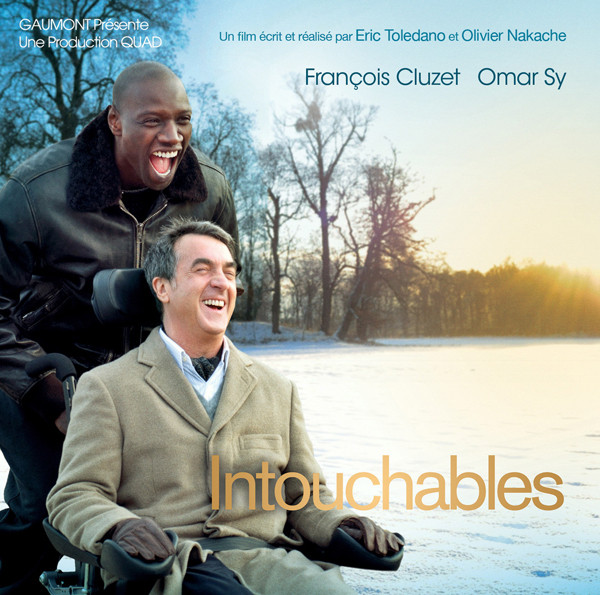The Intouchables – A Reflection on Disability and Caregiving: Who Helps Whom?
By Sarah Caston, PT, DPT, NCS
Current media rhetoric has recently been hyper focused around notions of exclusion, anger and misunderstanding between various groups of people. It is at this time that I am particularly rejuvenated by watching a poignant film which suggests that a meaningful connection between two people coming from very different “worlds” is not out of reach. The film “The Intouchables” relays a timely tale of harmonious connection and mutual respect between two individuals, who come from very different social spheres.

This film is powerful in its overt message challenging traditional views of disability; begging questions, such as: “What truly limits one’s engagement and participation in a full life? What does it indeed mean to have a full life?” These questions represent a few contemplative moments that will likely arise for viewers while watching this movie.
The movie “The Intouchables”, a film directed by French screenwriters Olivier Nakache and Eric Toledano, is based on a touching true story of a wealthy business man living with quadriplegia and his unorthodox caregiver, Driss. Philippe, (played by French actor François Cluzet) sustained a cervical spinal cord injury, resulting in immobility of his arms and legs at the age of 42. Philippe’s background is one of wealth and privilege, however also one of death and trauma (he lost his wife about a year after he was injured). By the time, Driss (played by actor Omar Sy) enters his elaborate mansion to “apply” for a posted job as a hired caregiver, Philippe is in a state of depression, having limited social contact with the outside world. Initially, not only does Driss have no true interest in working as Phillipe’s caregiver, he also appears to have no pity for Philippe, who must use a power wheelchair for mobility tasks. Phillipe, refreshed and intrigued by Driss’s ingenuous behavior, convinces Driss to come and work for him despite his lack of experience, or desire, to be his caregiver.
From there the screenplay unfolds captivatingly, inviting the viewer’s attention with seemingly blasphemous scenes, such as when Driss pours hot water on Philippe’s insensate legs, surprised by the lack of reaction; or Driss insensitively telling Philippe to pick up a ringing phone, forgetting that Philippe has no ability to use his hands. However, the provocative nature of these scenes are overshadowed by the recognition of the audience that Phillipe is grateful for genuine human interaction; one not clouded with excessive pity and discomfort with his physical impairments.

Cluzet portrays this well throughout the film as he, Philippe, begins to repossess a desire to live, to laugh and experience the world. There are many scenes, including the opening scene, where Philippe and Driss essentially embark on a “joy ride” in his Maserati Quattro Porte, being chased by police officers, and the invigorating scene where Philippe goes paragliding again, which was the activity that led to the cause of his injury. This openness and newly adopted vulnerability changes Philippe’s life in a variety of ways, including allowing himself to engage in a romantic relationship toward the end of the film. All the while, Driss stands by making crude jokes, and yet is still able to provide just the correct amount of “nudging” encouragement for Philippe to go out and live his life again.
The film is brimming with light-hearted adventure and humorous interactions between Philippe and Driss. However, this film demonstrates a wonderful conglomeration of amusing interactions and meaningful messages that incorporate powerful principles of disability, participation and human connection. Philosophical concepts of paternalism, autonomy, and the ever abstract definition of “a fulfilling life” weave a fine, complex thread throughout the film. Viewers may find themselves belly- laughing one moment, and in the next, wide eyed in wonder and thought, about how they may react given a life-altering situation where much of their presumed “capabilities” are taken away.
[pl_blockquote]Actors Cluzet (Philippe) and Sy (Driss) perform their roles with a raw quality that engages audiences in the dialogues so deeply, one feels as if they are strolling alongside them on the Parisian sidewalks or next to them in the art museums. Both of the actors portray powerful emotions traversing the spectrum from deep sorrow, anger and anxiety to exhilarating joy and warm acceptance.[/pl_blockquote]
The actors also fill their roles strikingly, initially highlighting the stark contrast between each other; Driss, a dark skinned, rough bred young man from the projects, standing in stark contrast to Phillipe, a fair skinned, royalty bred former entrepreneur with lavishness surrounding him. These apparent differences help set the stage for quirky and meaningful interactions that weave a story of friendship, harsh realities and redefining the term “independent”.
It is not surprising that this movie is acknowledged globally for its excellence in directing as well as acting. “The Intouchables” ranks as the second most successful French film of all time (second to 2008 film Welcome to the Sticks)1. The list of awards that this film has earned is lengthy, and serves as a demonstration of the impact this film has had on audiences world-wide:
- 2011: Best Foreign Language Film & Best Actor awards to François Cluzet & Omar Sy, Tokyo, Japan
- 2012: Best foreign film by the African-American Film Critics Association In NY, New York
- 2012: Lead actor, Omar Sy, won the award for Best Actor at the César Awards in Paris, France
- 2012: Best European Film at the David di Donatello Awards in Italy
- 2012: Best Foreign Comedy Trailer at the Golden Trailer Awards, USA
- 2012: Best Foreign Film by Phoenix Film Critics Society, Phoenix, AZ
- 2012: Best Foreign Language Film, The 17th Annual Satellite Awards, Los Angeles, CA
- 2012: Best Foreign Language Film, The St. Louis Gateway Film Critics Association, St. Louis, MO
- 2013: Best Foreign Film at the Goya Awards held in Madrid, Spain
- 2013: Outstanding International Motion Picture, NAACP Image Award, Los Angeles, CA.
- 2013: London’s Favourite French Film at a gala event held in Paris, France.
In addition to winning the above awards, the movie was nominated for awards in many countries across the globe. It has earned superior status and recognition as “the most successful French film” in many regions of the world such as Denmark, South Korea, Columbia, Peru, and New Zealand.

After seeing this movie many times, I am not surprised by the prestigious reputation the screenplay has earned. While the film’s poignant messages resonated with viewers across the world, it has also provided me with unique opportunities in my personal life and career to help others explore a more humanistic side of working and living with those who have disabilities. As a clinician and educator, I have leveraged the important concepts of this film by hosting opportunities for my students, as well as patients, to view this film. In hosting these viewings, it is my hope to instill the importance of genuine human interaction, by “humanizing” the experience of living with a disability. As oxymoronic as that may sound, (to try and humanize a lived experience), I believe this is an area we lack in as a culture. In my experience, it has led some of my students to ask introspective questions such as: “If I lost all/most of my physical capabilities, could I still be happy/content?” It positions them to take a moral inventory of their professional goals; identifying a purpose behind their practice. If Doctor of Physical Therapy students, or physical therapists themselves, do not believe in the ability to truly “live” after a severely disabling experience, then how will they help others to believe in that possibility? The answers are multi-faceted and complex, similar to this film. However, such personal philosophies are worth contemplating, and “The Intouchables” is definitely worth watching.
Click here to view more clips from The Intouchables on YouTube.
Footnotes
* An interview with Philippe Pozzo di Borgo and Abdel Sellou, the friends who inspired the movie, can be found here.
References
- Nakache O, Toledano E. The Intouchables. [DVD] France/US: The Weinstein Company; 2012.



 Member since 2019 | JM14274
Member since 2019 | JM14274


NO COMMENT